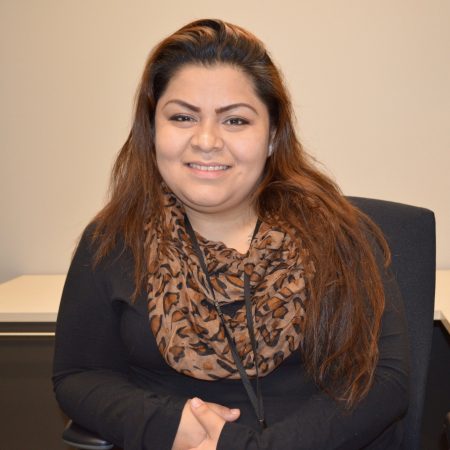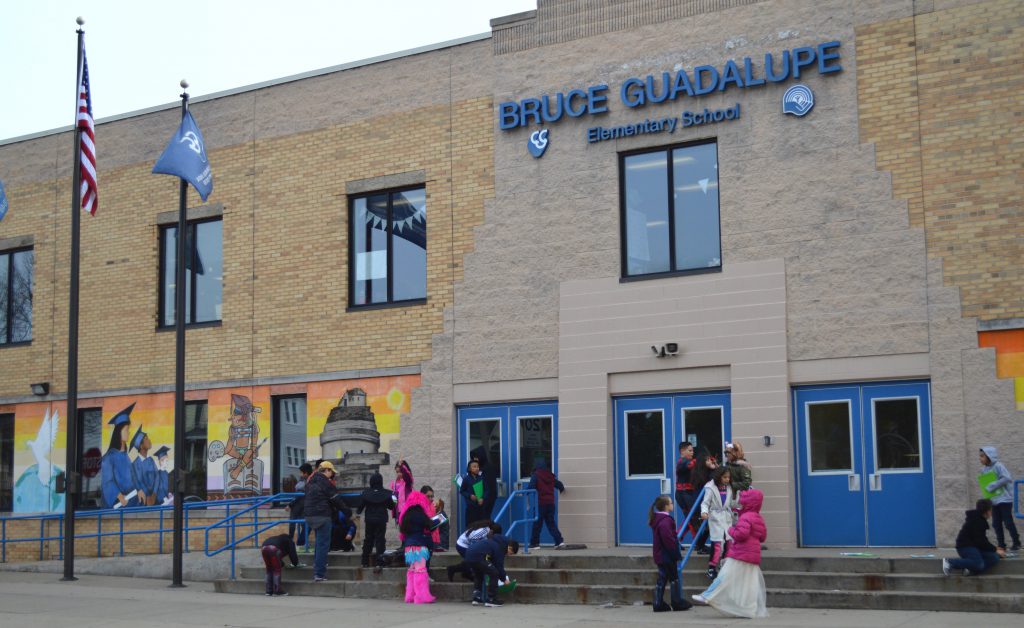Schools’ Program Provides Mental Health Care
Students from south side UCC schools get mental health help both at school and home.
A new pilot program at Bruce Guadalupe Community School and Acosta Middle School is addressing children’s mental health needs both at school and in the home.
Lutheran Social Services of Wisconsin and Upper Michigan (LSS) hired a therapist and a family coach in September to work with families of students who are receiving mental health services at the schools.
Bruce Guadalupe, 1028 S. 9th St., serves students in K4 through eighth grade while Acosta, 1038 S. 6th St., serves sixth- through eighth-grade students. Both charter schools are operated by United Community Center (UCC).
According to Amanda Kryzkowski, director of performance and quality improvement at LSS, children are referred to the program by the school counselor. The LSS therapist works with children during the school day, and the family coach makes weekly in-home visits. Fourteen children and their families are participating, and LSS hopes to expand that to 50 by the end of the school year.
For children who may be dealing with anxiety, depression, PTSD or other mental health problems, the therapist provides behavioral interventions for the classroom, and the family coach promotes parent skill development.
The purpose of integrating mental health services into students’ home life is to reduce the need for foster care, lower truancy rates and school violence, and improve academic achievement, according to LSS.
LSS is using Bruce Guadalupe and Acosta as hubs to provide on-site therapy to children, according to Héctor Colón, president and CEO of LSS. “But then we want to wraparound to the parents; it might be mom, dad, grandmother… [a] cousin or friend that happens to be within that household.”

LSS Family Coach Delia Corchado works with 14 children from two UCC schools and their families. Photo by Analise Pruni/NNS.
Delia Corchado, the family coach at LSS, said that most families want to receive services and support for themselves and their children. However, if they cannot afford basic needs such as food and transportation, it is more difficult to convince them to take advantage of the services.
“If they don’t have food on the table then they don’t have time for me,” Corchado said.
She added that families have access to any services that they need, such as counseling, food pantries, clothing banks or help with transportation. These are all contributing factors to a child’s overall mental health.
At the same time, “The backbone of successful treatment is relationship and connection,” said Dr. Steven Dykstra, a clinical psychologist at the Milwaukee County Behavioral Health Division.
The pilot program originated from a discussion between Colón and UCC Executive Director Ricardo Díaz about the need for a more proactive mental health program at the schools. Colón recognized that because UCC has close connections to parents, it would make a perfect partner with LSS to broaden access to children’s mental health services.
“Through our pilot with United Community Center, we hope to close the gap and give children the resources they need to grow into successful and thriving young adults by building healthy communities, beginning with a strong foundation of mental wellness,” Colón said.
LSS hopes to receive state funding to institute five other school-centered pilot programs. It has established a committee consisting of state and county representatives, mental health advocacy groups and community organizations to address local and state policy changes needed to sustain the programs.
“What we’d like to do is … achieve policy change for a more comprehensive model of school-based mental health,” Colón said. That could include higher Medicaid reimbursements for clinical consultations and in-home family coaching.
According to Dr. Judith McMullen, a law professor at Marquette University who is on the LSS committee, by reaching beyond the boundaries of school walls, mental health professionals have a better chance of meeting children’s needs. “Kids don’t have issues in a vacuum. … Some issues stem from things going on at home.”
Pascual Rodriguez, principal of Bruce Guadalupe, said he is a firm believer in educating children physically, spiritually and emotionally.
“I would consider my guidance counseling team the best in Milwaukee, but there are limitations on what we can and cannot offer some of these kids,” he said. The LSS program helps fill that gap.
Dykstra added that with school-centered mental health programs, “We’re not turning to schools and saying, ‘do something about the mental health of children;’ we’re saying, ‘let us work with you, let us partner with you, let us bring more resources to the school environment.”
McMullen said that the Columbine shooting in 1999, in which 13 students were shot to death by two classmates, was a catalyst for viewing school as an appropriate place to address youth mental health. This shift in thinking has helped reduce stigma, she added.
According to Dykstra, famous athletes and celebrities who publicly discuss mental health also help lessen the stigma surrounding mental illness. Familiarizing children with these topics often, and from an early age, is beneficial.
“When they’re 16-17 and they’re facing depression or anxiety, the fact that this was destigmatized for them in childhood makes it easier for them to go [receive treatment] 10 or 20 years from now,” Dykstra said.
This story was originally published by Milwaukee Neighborhood News Service, where you can find other stories reporting on eighteen city neighborhoods in Milwaukee.






















